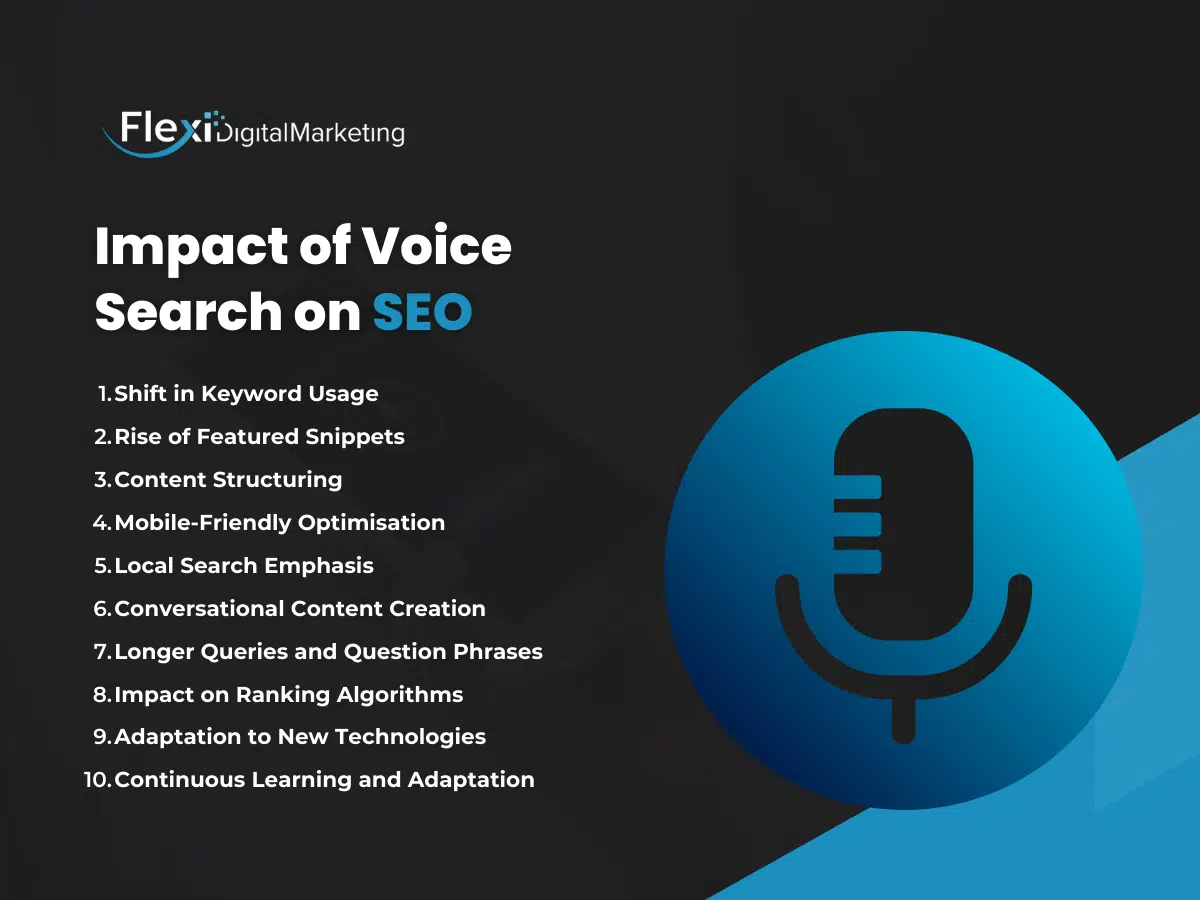We can all agree that technology has changed how businesses interact with people and market their products and services. In this case, like the impact of voice search on SEO (short for search engine optimisation) and how more people use it to find the information they need fast.
But, it does not stop there. During the height of the global pandemic, people used voice assistants to minimise the risk of further spreading the virus. Its convenience and hands-free nature have made it so easy to incorporate into people's day-to-day lives.
So much so, that more and more people are using it now. Its impact is so big, that the worldwide market for voice recognition technology is anticipated to reach an approximate total of $50 billion by 2029.
It has had a significant influence on business as well. In this article, we will get more specific and focus on its relation with digital marketing. Specifically, the impact of voice search on SEO so that you have a better idea of how you can leverage it to your advantage.
What is Voice Search?
As its name already suggests, voice search refers to inputting your query using your voice instead of typing in words on your device to look up information.
The way that voice search works is that it uses the automatic speech recognition system (ASR) to transform your audio-based query input into text and then searches the Internet for the answer.
To give you an in-depth look at the process, here is a breakdown:
- You use Google Voice Search on your mobile device and ask a question.
- The app filters out the background sounds and focuses on your voice to understand your query.
- The system digitises your question from sound waves into digital data, such as text.
- The Google Voice search app sifts through the information on the Internet to find answers that are relevant to your query.
- The app presents you with the best answer without opening a web page.
- After presenting the relevant information to you, the voice search app also studies the patterns and compares them to similar queries within its database.
Thanks to innovation, devices like your smartphone are much more capable of understanding what people say and the intent behind the query to provide better results.
What is the Importance of Voice Search to SEO
You are already familiar with SEO as a tried-and-true method for boosting your website's visibility through targeted keywords. With voice search in the picture, people changed how they articulate their questions—it has become more conversational and detailed.
This shift gave rise to the voice SEO strategy. It is a technique that adapts existing SEO practices to accommodate voice-based questions and optimises your website’s content specifically for voice search.
Moreover, it is essential to note that voice search and SEO have a symbiotic relationship. Without SEO, voice search cannot effectively understand people's queries and provide relevant results.
Impact of Voice Search on SEO
Marketing trends have changed over the years in response to how people change their behaviour and interact with technology—one of which is the impact of voice recognition search in SEO.
With that said, listed below are the ways that this specific technology and your digital marketing efforts can be used in tandem for your business’s benefit.

Shift in Keyword Usage
The impact of voice search on SEO has first made a shift in keyword usage. As mentioned earlier, people's queries are now more conversational and intricate.
In response to this, digital marketers and brands have started to optimise their content to capture the traffic generated by voice search. One, there are more long-tail keywords in articles and blogs. Two, there is a conscious effort to sound more conversational to match how people phrase their queries.
Rise of Featured Snippets
Another impact of voice search on SEO is that people get more concise and straightforward answers from featured snippets.
Featured snippets are also known as position zero. These are excerpts that you see at the very top that provide people with quick and straightforward answers to their queries. These usually pop up if your search intent is informational.
Consequently, if you want your website to be a featured snippet, you need to create content that effectively answers search queries that have informational intent.
Content Structuring
Content structuring refers to how you organise the information you share on your website in a certain way. Specifically, when you use semantic markups or special labels. It is a way to ensure search engines can easily understand your content a lot better.
Making sure that your content is clear and understandable to search engines makes it a lot easier for them to find the answers that are relevant to people's search queries. For your business, this means it is a lot easier for your website to be found even with voice search.
Mobile-Friendly Optimisation
Optimising your website for mobile devices is essentially a must-do at this point. But, given the impact of voice search on SEO, it further underlines why it is an important aspect that should not be overlooked.
The majority of the people who use voice search do it on their mobile devices. In the context of increasing the organic traffic of your website, more people are likely to stick around if it is optimised to be mobile-friendly.
There are a few things you need to focus on when optimising your website for mobile devices. The first is functionality, like how easy it is for people to navigate around your website. The second is design since people are becoming more conscious of how a website looks.
Local Search Emphasis
A portion of the total voice searches people make are usually location-based. This means people are looking for information about nearby shops, services, restaurants, and other businesses and attractions that are easily accessible to them.
If your business has a physical establishment, this is important. The best way to make sure that your shop is visible to people nearby is to optimise your website for local SEO. There are a few examples of doing this, like:
- Google My Business
- Structure Data Markup
Conversational Content Creation
When it comes to SEO, voice search also influences the latest content marketing trends. Specifically, most published content shared online sounds more conversational.
Not surprising because Google Assistant alone receives more than 70% of the queries phrased with how people speak to another person. People moved from using short-phrased queries like “SEO trends 2023” or “voice search strategies” to longer-phrased questions that answer “who,” “what,” “when,” “where,” “why,” and “how.”
This shift in trend due to voice search’s influence can have a significant impact on your SEO performance in a couple of ways:
- Google prioritises content that matches the way people phrase their voice search queries. As such, if your website’s content achieves this you can climb the search engine ranks and increase your visibility.
- More conversational articles are more effective in answering people’s queries and are easier to understand. In turn, this will potentially increase your conversion rate.
- When content is more conversational, it is more engaging and relevant to your audience. Consequently, this small detail will help improve user experience which will more likely encourage them to stay longer on your website.
Longer Queries and Question Phrases
As mentioned above, people’s queries are more conversational and phrased longer since the way we talk to voice assistants mirrors how we talk to each other. This detail is one of the defining differences between voice search and type-written queries.
That is why you are more likely to ask, “Which cafes near me sell arabica beans?” instead of “arabica beans near me” when you are going about your day doing your errands.
This means that you need to adapt the way people speak and incorporate longer conversational key phrases in your content. You can increase your website’s visibility to voice searches the more relevant you are to your target audience by answering longer queries and providing useful and detailed information.
Impact on Ranking Algorithms
Another impact of voice search on SEO is how search engines are ranking websites, specifically the ranking algorithm itself. Google does not just focus on keywords anymore. Because people’s style of phrasing their queries changed, it also changed how it decide which sites to rank up for each specific key phrase.
For your business, this means you need to pay attention to a couple of details:
Location
If you have a physical store or headquarters, it is important to make sure your location is shared on your website since this can be a big factor in increasing your visibility to potential local customers using voice search.
Search History and Behaviour
Search engines factor in people’s most recent search history to provide personalised results. In your case, it is important to understand your target audience’s behaviour and what they are searching for right now.
Structure Data
Use Schema Microdata to help Google understand your content better, like who wrote an article and where your business is headquartered, to make it more visible to voice search.
Content Clusters
Voice search looks for sources that already provide the complete answer to a specific question. Do not just focus on relevant keywords and key phrases, make sure to organise your content and go into detail to give value to your audience.
Answer Follow-Up Questions
When creating content for specific queries, also think about the relevant questions that people might ask as well. Answering these potential follow-up questions provides more value to your audience and increases your chances of being shown on voice search results.
Adaptation to New Technologies
The appearance of voice search and other new technologies signals a change in people's behaviour and how you market your business. Consequently, search engines like Google also evolved to better adapt to these changes.
Of course, the adaptation of voice search is not only limited to improving your website’s SEO performance. There are a couple of ways you can explore to aid your marketing efforts:
Voice Commerce
This enables you to provide your customers with a different shopping experience. By using voice commands, they can browse and complete their purchase.
Voice-Activated Devices
Another way to increase the visibility of your brand to your potential customers is to develop applications that go with smart devices like Google Home.
Voice Search Analytics
You can also fine-tune your SEO strategies and effectively optimise your website with voice search analytic tools to keep tabs and analyse voice search trends, relevant queries that are frequently asked, and your target audience’s behaviour.
Voice Search Advertising
This presents you with an opportunity to provide value by answering relevant queries while also advertising your offerings. An example of voice search ads is showing ticket prices while answering the question, “How long does it take to fly from Australia to the Philippines?”
Multilingual Voice Search
The Google Voice Search app can understand multiple languages and cater to a lot of people from around the world. If your aim for your business is to go global, this is one way to open you up to the opportunity to broaden your customer base.
Continuous Learning and Adaptation
Likely, the influence and impact of voice search on SEO do not stop here. There are always new innovations that are coming out as of this writing that will further broaden its applications.
This just goes to show that the methods we use today will also improve and provide you with more avenues to raise your website’s SEO ranking and aid in your overall marketing efforts.
That is why it is vital to quickly adapt to innovations as they come. Not only does it ensure that you are in step with your competition, but it may also give you an edge over the late adopters. Moreover, being one of the early adopters, like optimising for voice search since its initial launch, would have given you a leg up.
Even so, seeing the way voice search has changed people’s search behaviour still provides you with a lot of opportunities to reach and establish a connection with your target audience. Now, it is a matter of applying voice search SEO strategies to leverage this technology to your advantage.
Start using Voice Search on your SEO strategies with Flexi Digital Marketing.


